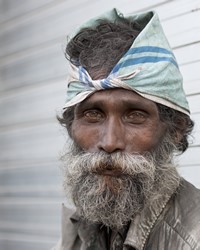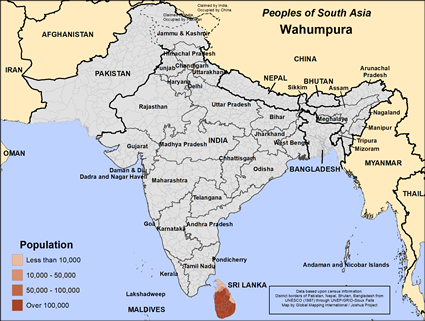Wahumpura in Sri Lanka

Photo Source:
Brett Davies - Flickr
Creative Commons
|

Map Source:
People Group data: Omid. Map geography: UNESCO / GMI. Map Design: Joshua Project
|
| People Name: | Wahumpura |
| Country: | Sri Lanka |
| 10/40 Window: | Yes |
| Population: | 8,865,000 |
| World Population: | 8,865,000 |
| Primary Language: | Sinhala |
| Primary Religion: | Buddhism |
| Christian Adherents: | 7.01 % |
| Evangelicals: | 0.00 % |
| Scripture: | Complete Bible |
| Ministry Resources: | Yes |
| Jesus Film: | Yes |
| Audio Recordings: | Yes |
| People Cluster: | South Asia Buddhist |
| Affinity Bloc: | South Asian Peoples |
| Progress Level: |
|
Introduction / History
The Wahumpura or Dewa are a Sinhalese tribe that speaks the Sinhala language. They are the dominant ethnic group in Sri Lanka, an island off the southeastern coast of India. The majority of the population resides mainly in the central and southwestern portions of the island. The Sinhalese have lived in Sri Lanka for more than 2,000 years. They lived under European rule for over 400 years until Sri Lanka was granted independence from Great Britain in 1948.
The Sinhalese are divided into two major groups. The first group is the mountain-dwelling Kandyan Sinhalese, who are known as a more traditional, conservative people. The second is the Low Country of Sinhalese, who live in the coastal lowlands and are more cosmopolitan and progressive. Within these two, there are castes, including the Wahumpura.
What Are Their Lives Like?
The Sinhalese follow Buddhism, but because of Sri Lanka's proximity to India, the people also lean heavily on the Hindu caste system. Castes are ranked social classes that are based on birth and occupation. For example, farmers have their own caste, fishermen have another caste, and priests have yet another caste. Individuals are born into their parents' caste. Members of a highly ranked caste generally attempt to avoid contact with members of lower castes to avoid spiritual pollution. In economic terms, caste becomes a bargaining chip for goods and resources.
The largest caste among the Sinhalese is the farming caste, whose members number about one-half of the total Sinhalese population. The great majority of the farmers grow rice but they also grow coconut, manioc, tomatoes, potatoes and onions. Marijuana is a cash crop for some. The Sinhalese employ virtually no modern tools and rely almost entirely on their hands or hand tools. Most farming families also keep animals such as cattle, water buffalo, sheep, goats, chickens and pigs.
Almost all Sinhalese marriages are monogamous, composed of one man and one woman. However, a wealthy man may occasionally have more than one wife. Traditionally, marriage required no ceremony; a man and a woman simply started living together with their parents' consent. Today, however, that type of marriage is rare, and most couples hold a ceremony and sign a marriage license.
What Are Their Beliefs?
Most of the Wahumpura belong to the Theravada branch of the Buddhist religion. Although the Wahumpura adhere to basic Buddhist teachings, they follow many Hindu beliefs as well. For example, Buddhism is unconcerned with the Hindu pantheon of millions of gods, but the Wahumpura worship Hindu deities who they believe control daily life. Over time, the people may come to see a formerly popular god as inadequate, and they may change their allegiance to another god. In addition to gods, the Sinhalese believe in demons, whom they must appease through rituals conducted by exorcists.
What Are Their Needs?
Literacy in Sri Lanka is high, and most people have access to adequate food, shelter, and healthcare. However, Sri Lanka remains one of the poorest South Asian nations due to its low industrial growth rate.
Even more overwhelming than the Wahumpura's physical needs are their spiritual needs. Although a few converted to Christianity during the colonial period, most still have no practical understanding of the gospel message. They still need the fragrance of Christ to permeate their families.
Prayer Points
Ask the Lord of the harvest to send missionaries who can witness to the Wahumpura in culturally relevant ways.
Ask the Lord to soften the hearts of the Wahumpura and give them a craving for spiritual truth.
Pray that God will use the few Wahumpura believers to disciple others.
Pray that strong local churches will plant more churches throughout Sri Lanka.